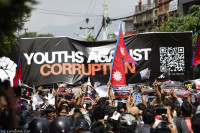Opinion
Not working
Constraints on effective development planning are pretty much the same now as they were in the 1960s
The Ministry of Finance (MoF) and the National Planning Commission (NPC) are the two most important government agencies responsible for designing fiscal policy, which primarily consists of prioritising public expenditure and mobilising internal (tax and non-tax revenue) and external (grants and loans) resources. They also oversee formulation of laws and policies that have fiscal implications, prepare medium- and long-term development plans and advise the government on the optimal path to achieving political-economic priorities.
However, with their existing administrative structure, leadership style, and roles and responsibilities, these two crucial agencies are increasingly ineffective in fiscal management and economic planning. Ministers, secretaries and joint secretaries from other ministries regularly complain about the implementation hurdles in these bodies such as delays in budget approval, insufficient fund allocation, and a heavy-handed approach to the selection of sector-specific projects. This lack of effective inter- and intra-ministry coordination and haphazard project planning contribute to the low capital spending. Last year, for example, only 56 percent of planned spending was expended. The functional and administrative structure of the MoF and the NPC, which was created about six decades ago and marginally tweaked in successive years, cannot effectively respond to the fiscal management and economic development challenges the country faces now.
Recurring issues
Despite the socio-political changes over the decades, the constraints on effective development planning and its implementation are pretty much the same now as they were in the 1960s. In a 1972 paper titled ‘Why Planning Fails in Nepal?’ published in the journal Administrative Science Quarterly, Aaron Wildavsky (the then dean of the Graduate School of Public Policy, University of California at Berkeley) outlines the probable reasons: “insufficient information, few and poor project proposals, inability to program foreign aid, opposition of the finance ministry, and severely limited capacity to administer development.” The paper highlights the ritualistic meetings at the NPC and its lack of authority; inadequate attention to boost absorption capacity by determining targets and outlays; lack of competent and relevant officials at the helm of planning and budget execution; and the rise in recurrent expenditure due to shoddy capital spending.
Furthermore, other problematic issues outlined in the paper are the under-execution of capital budget; the cumbersome and obstructive processes at the MoF and the NPC to release funds for already approved projects; a tug-of-war between the NPC and the MoF in planning, financing and monitoring of projects; high staff turnover; low incentive to perform better; deficient technical education of divisional heads (joint secretaries) or project directors; and a culture of waiting for orders from above to skip decision-making on management and implementation issues by project directors. In essence, “economic development is only a sometime thing for them”, concludes Wildavsky.
These were some of the administrative and operational issues hindering planning and implementation back in 1972, when the economy was still closed to competition and trade. Fast forward to 2016 and these issues still remain the same despite the economy’s liberalisation, entry into the global and regional trade regimes, a devastating decade-long Maoist insurgency, and a sea of change on social, economic and political fronts. It, unfortunately, points to the fact that these two agencies have failed to evolve to confront the emerging economic and development challenges.
In every monthly or quarterly project portfolio meetings, these issues are discussed without much sense of responsibility. The ministries point fingers at the MoF and the NPC, and vice versa. At best, they end up forming a committee to study the constraints and recommend appropriate remedies. This drama of project planning, budget approval and implementation and formation of countless committees is repeated in every budget cycle.
The MoF officials act as if they are the ultimate authority to decide on project selection, planning and financing and, at times, even impose their will on the line ministries by controlling budget allocation and approval. Meanwhile, the NPC veering off its intended path is lost in the political and bureaucratic quagmire. It has become a toothless organisation with no tangible authority to make line ministries follow the path outlined in the medium- and long-term development plans. Its top leadership has remained unstable and busy in inaugurating insignificant workshops, attending futile overseas seminars and bickering with politicians over petty projects. The core functions of development planning and policy advising to the government are forgotten. Amidst this mess, the line ministries are seeking guidance on project preparation, planning, funding and implementation along with appropriate policies and laws.
Restructuring the two agencies
The corridors of the MoF and the NPC are most abuzz during budget preparation. But except for the fruitless yet ritualistic portfolio meetings, they remain largely silent during the phase of budget execution. Hollow steps are taken to deal with issues on project implementation by forming countless committees and subcommittees while, in reality, real progress is as elusive as it was six decades ago.
This has to change now. As a start, the functional and administrative restructuring of the MoF and the NPC should be initiated. The NPC should focus on designing and monitoring medium- to long-term development agenda with a time-bound action plan to be implemented by the line ministries, on assisting the line ministries in project readiness, including public private partnership projects, and on advising the government on fiscal and development issues. Additionally, given the shortage of investment-ready projects, the NPC should work with line ministries to come up with a project bank, which may include shovel-ready projects that could be taken up for implementation if funds are available.
Meanwhile, the MoF needs to focus on fiscal management—expenditure and debt management and resource mobilisation (revenue and foreign aid). It still lacks a centralised public debt management office, which could effectively shoulder the responsibility of managing domestic and foreign debt. Instead of micromanaging the line ministries’ projects, the MoF should focus on arranging and approving funds to the projects that need it the most. Furthermore, its Chief Economic Advisor’s office, Economic Policy Analysis Division, Revenue Management Division, and Budget and Programme Division need to be more agile and effective. They all should facilitate, not hinder, project implementation across all ministries.
Sapkota is an economist




 10.12°C Kathmandu
10.12°C Kathmandu









